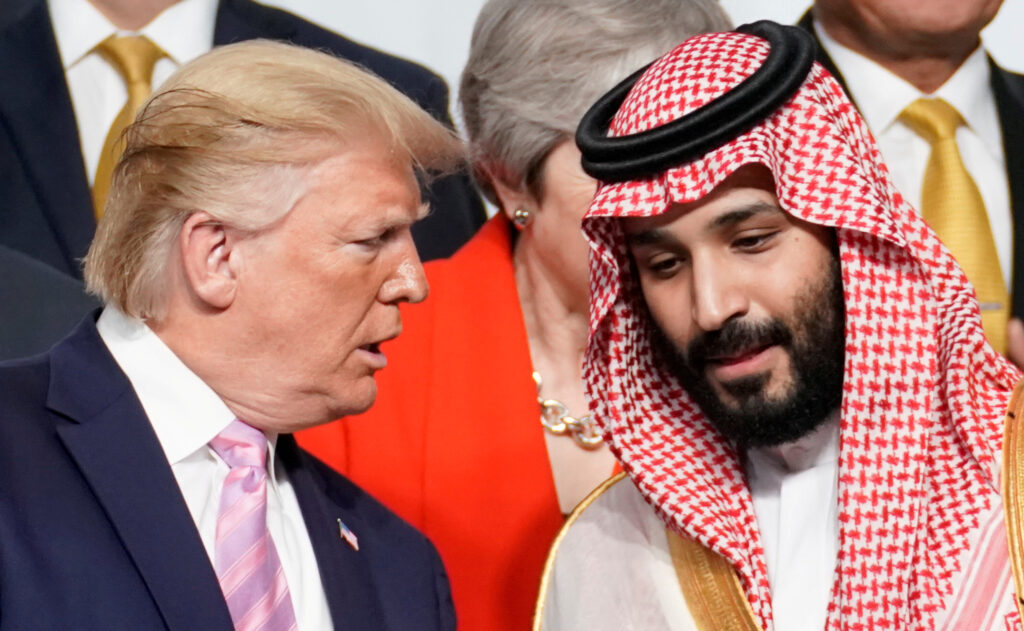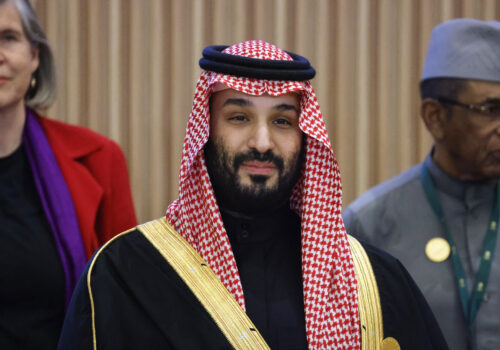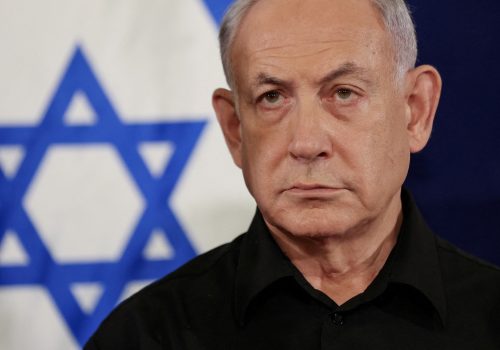By all accounts, US President Donald Trump’s upcoming visit to the Middle East will not prioritize major diplomatic breakthroughs. White House sources have indicated that the president will focus on “deals” in his visits to Saudi Arabia, the United Arab Emirates, and Qatar. By this, they mean opportunities to increase investment by these wealthy countries in the United States, deepen coordination on artificial intelligence (AI), and expand energy cooperation. There is also talk of announcing a major arms sale to Saudi Arabia.
Trump may have some other deals in mind. It should come as no surprise that his first three foreign stops (save his trip to Rome for Pope Francis’ funeral) are in countries where the Trump Organization, run by his sons Eric and Donald Trump, Jr., is advancing major real estate projects, including a high-rise tower in Jeddah, a luxury hotel in Dubai, and a golf course and villa complex in Qatar.
But that does not mean that Trump should not be pursuing diplomatic breakthroughs.
The biggest opportunity remains expansion of the Abraham Accords, a signature achievement of Trump’s first term—and Washington’s sights are particularly set on Saudi Arabia. Throughout the second half of former President Joe Biden’s administration, including after Hamas’s October 7, 2023, terrorist attack on Israel that launched the war in Gaza, the United States and Saudi Arabia conducted intensive negotiations on a series of agreements intended to foster Saudi-Israeli normalization. These pacts were not finalized, but were within reach. The two most important were a mutual defense treaty and a civil nuclear energy agreement—both high-priority items for the Saudi Crown Prince Muhammad bin Salman.
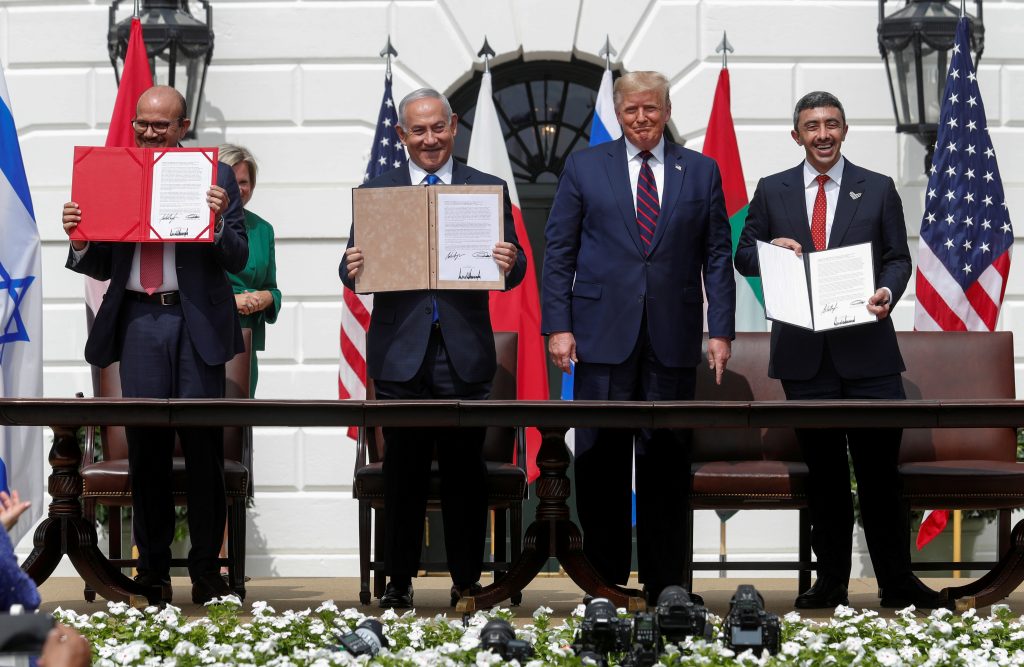
Questions now hover over the viability of both those agreements. Trump prefers to avoid new Middle East entanglements, and faces pressures from corners of his administration who favor prioritizing deployments in the Indo-Pacific as a means of checking China. This may make the US president reluctant to sign a binding treaty that would commit Washington to maintain certain forces in the region, and the ability to surge others when needed, to help defend the Kingdom.
SIGN UP FOR THIS WEEK IN THE MIDEAST NEWSLETTER
The Saudis, on the other hand, may ask a different question: considering Trump’s lack of enthusiasm toward existing US treaty allies in NATO, how valuable would such an alliance be? A separate concern is whether Trump, with his scorched earth governing style, could win the votes of fifteen or more Democratic Senators needed to ratify a treaty.
During Secretary of Energy Chris Wright’s visit to the Gulf in April, he said the United States and Saudi Arabia are “on the pathway” to a civil nuclear energy deal. Riyadh has sought an agreement to allow uranium enrichment to take place on its soil for use in civilian energy, but exclusively under US control to ensure it is not diverted to weapons use. But as nuclear talks between the United States and Iran inch forward, the Saudis may pause before alighting on an agreement that puts them at a disadvantage to Iran. The US-Iran talks very much hinge on the question of enrichment—Iran insists on retaining that ability, and the United States has left unsettled whether it firmly demands an end to all enrichment.
But the toughest question is, can Saudi Arabia proceed with normalization with Israel while the war in Gaza remains so unsettled, especially as Israel prepares for an expanded military operation in the enclave? For a Crown Prince who is popular with his people for making Saudi Arabia a more open society, he still tries to be attentive to the public mood, which includes concern for Palestinian civilians in Gaza. Perhaps this is why US Special Envoy Steve Witkoff hinted that there may be forthcoming announcements on trying to expand the Abraham Accords, but the target timetable for progress is 2026. Trump should use this trip not to clinch normalization, but to keep the momentum towards it alive.
The unsettled war in Gaza remains a bottleneck, slowing progress toward other regional goals. The fault lies with Hamas, which brutally launched the war 19 months ago and still refuses to release the fifty-nine remaining Israeli hostages, including between 21 and 24 who are still alive. However, Trump has missed opportunities to change direction, as well. He could have pushed Israeli Prime Minister Benjamin Netanyahu to continue with Phase Two of the ceasefire and hostage deal signed in January. That would have bought a longer period of calm, created space for diplomatic progress, brought all living hostages back to their families, and allowed a surge of humanitarian aid to enter Gaza—no aid has entered Gaza since the ceasefire collapsed in early March. It still would have left the unsettled and necessary task of removing Hamas from power in Gaza, whether through renewed Israeli military action or the active participation of Arab states. While Phase Two may not be viable immediately, Trump can helpfully signal to all parties that he is no longer pursuing a Gaza Riviera plan that involves the complete evacuation of Palestinians from Gaza. That would steer back toward working with Arab states to develop a more realistic plan to end the war with hostages released, Hamas removed from power, and Gaza rebuilt for Palestinians prepared to live peacefully alongside Israel.
Trump’s other two stops are relevant here. Netanyahu has proposed another partial ceasefire and hostage deal: ten to twelve live hostages for six weeks of ceasefire. The Israeli cabinet has approved an expanded operation in Gaza, which they say will begin if there is no ceasefire agreed by the end of Trump’s trip. Hamas rejects the partial deal, holding out for Phase Two, which would include an “end of conflict” declaration. Trump should insist that Qatar, a key mediator that has hosted Hamas’s external leadership, pressure the militant group to accept the partial deal. That would buy valuable time before a campaign commences that will cost the lives of Israeli hostages, Israeli soldiers, and Palestinian civilians, and may result in Israel’s full reoccupation of Gaza, which would place a heavy burden on efforts to expand the Abraham Accords. It would also enable the administration to set up a new Gaza Humanitarian Foundation, with Gulf funding, to provide humanitarian aid to Palestinian civilians safely, while keeping it out of Hamas’ hands.
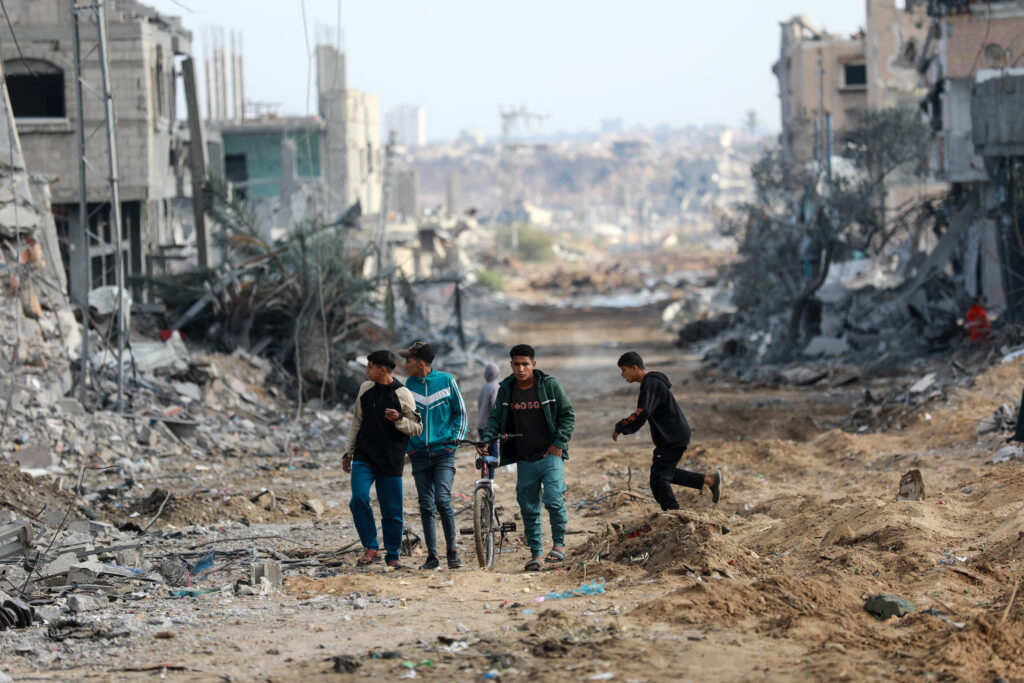
In Abu Dhabi, Trump can seek support from the UAE—with perhaps the most capable Arab military—to contribute to an Arab stabilization force that could provide security in Gaza after Hamas’ removal. In all three of these well-resourced capitals, Trump should explore an Arab and Turkish-led and -financed effort to pressure Hamas leaders and fighters to leave Gaza and facilitate their departure to distant locales—the only prospect to remove Hamas from power by non-military means.
In the Middle East, the biggest deals are about more than money. Trump should use his time there to keep his eye on bigger prizes: a deal to bring all hostages home, renewed humanitarian aid to Gaza, the removal of Hamas from power, and advancing toward eventual Israeli-Saudi normalization.
Daniel B. Shapiro is a distinguished fellow with the Atlantic Council’s Scowcroft Middle East Security Initiative. From 2022 to 2023, he was the director of the N7 Initiative. He has previously served as Washington’s deputy assistant secretary of defense for the Middle East and as US ambassador to Israel.
Further reading
Thu, May 8, 2025
Trump’s Gulf gamble: Oil, conflicts, and opportunities in a high-stakes visit
New Atlanticist By Racha Helwa
Trump’s trip to the Middle East is a pivotal opportunity to reimagine US–Gulf relations for a new era.
Mon, May 5, 2025
How China turned the Red Sea into a strategic trap for the US
MENASource By
Beijing’s proxy warfare turns global trade routes into battlefields that the United States struggles to defend.
Mon, Apr 28, 2025
Why Israel will resist any US-Iran nuclear deal
MENASource By Danny Citrinowicz
Negotiations between the United States and Iran have displayed a significant divide between Washington and it’s ally Israel.
Image: U.S. President Donald Trump speaks with Saudi Arabia's Crown Prince Mohammed bin Salman during family photo session with other leaders and attendees at the G20 leaders summit in Osaka, Japan, June 28, 2019. REUTERS/Kevin Lamarque TPX IMAGES OF THE DAY
